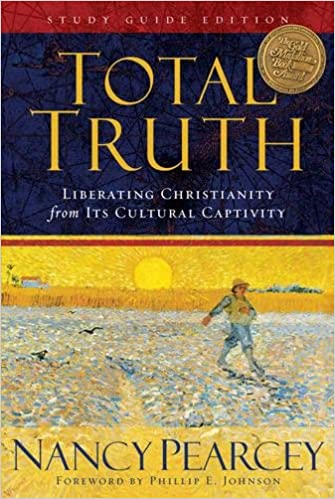A Brief Book Summary from Books At a Glance
By Benjamin J. Montoya
About the Author
Nancy R. Pearcey was one of the hippies who stumbled across Francis Schaeffer’s ministry L’Abri in Switzerland in the early 1970s and was surprised to discover that there are actually good reasons and arguments supporting Christianity. She gave up her agnosticism and ever since has been writing about Christianity as a worldview that applies to every area of life.
Introduction
This book is about a view of truth that is part of a larger Christian worldview. What is a worldview? Why is it important that we do not accept a two-tiered view of truth versus a view of total truth? Consider this important book from Nancy R. Pearcey for more.
Table of Contents
Section 1 What’s in a Worldview?
Chapter 1 Breaking out of the Grid
Chapter 2 Rediscovering Joy
Chapter 3 Keeping Religion in Its Place
Chapter 4 Surviving the Spiritual Wasteland
Section 2 Starting at the Beginning
Chapter 5 Darwin Meets the Berenstain Bears
Chapter 6 The Science of Common Sense
Chapter 7 Today Biology, Tomorrow the World
Chapter 8 Darwins of the Mind
Section 3 How We Lost Our Minds
Chapter 9 What’s So Good about Evangelicalism?
Chapter 10 When America Met Christianity—Guess Who Won?
Chapter 11 Evangelicals’ Two-Story Truth
Chapter 12 How Women Started the Culture War
Section 4 What Next? Living It out
Chapter 13 True Spirituality and Christian Worldview
Summary
Section 1: What’s in a Worldview?
Chapter 1: Breaking out of the Grid
We probably all know people who after they graduated from high school and moved to college, they also graduated from church attendance and membership. Some of these people end up living lives that directly contradict the Bible and their prior profession of faith. What happened in these cases? Without trying to sound overly simplistic, there is a worldview problem, at the very least. What does that mean?
A worldview is the lens through which we see the world, make decisions, think through things, etc. It colors everything we see and do—for better or worse. A worldview answers at least three basic questions:
- Creation: how did everything begin?
- Fall: what went wrong?
- Redemption: how do we make things right?
Every worldview answers these questions very differently. Christianity says that the God of the Bible created everything good (Creation), mankind sinned against God (Fall), and salvation in Christ by grace through faith is how things are made and will be made right (redemption). God will eventually win and set all things right as they were intended to be.
Many people in our culture do not operate from a Christian worldview. Many people answer these worldview questions very differently. One way that this can be seen is in a two-tiered view of truth. This view of truth goes by different names, but one of the most popular versions is the secular/sacred divide. This divide goes something like this:
Secular: scientific knowledge
Sacred: personal preferences
What comes along with this divide is a new view of truth:
Upper story: nonrational, noncognitive
Lower story: rational, verifiable
Within this view of truth, religion gets put in the upper story category. That is part of the reason why people depart from Christianity in college. They get confronted with other beliefs that challenge them, they accept them in their lower story view of truth, and then Christianity, if it remains at all, gets put in the upper story.
What are we supposed to think of this new view of truth? The following chapters will answer this question further.
Chapter 2: Rediscovering Joy
One of the issues that has come from this two-tiered view of truth is unhappiness and depression. Imagine someone who is a successful lawyer who is a Christian and “has it all” by this world’s standards. Yet, this same person comes down with depression. Why? Because he thought if he really wanted to serve God, he would have gone into Christian ministry. If this so? Does someone have to go into vocational ministry to serve God?
Although people can serve God in vocational ministry, they can also serve God in nearly any other career as well. The reason why this lawyer struggled with this issue comes back to an underlying view of the two-tiered version of truth. The problem with this view is that we are all tempted by it one way or another. We have to be discerning about it because the Bible does not teach it. This view, however, has affected Christians throughout Church History. That is why monks would leave the world to “serve God.” This view, however, did not remain pervasive.
[To continue reading this summary, please see below....]The remainder of this article is premium content. Become a member to continue reading.
Already have an account? Sign In
